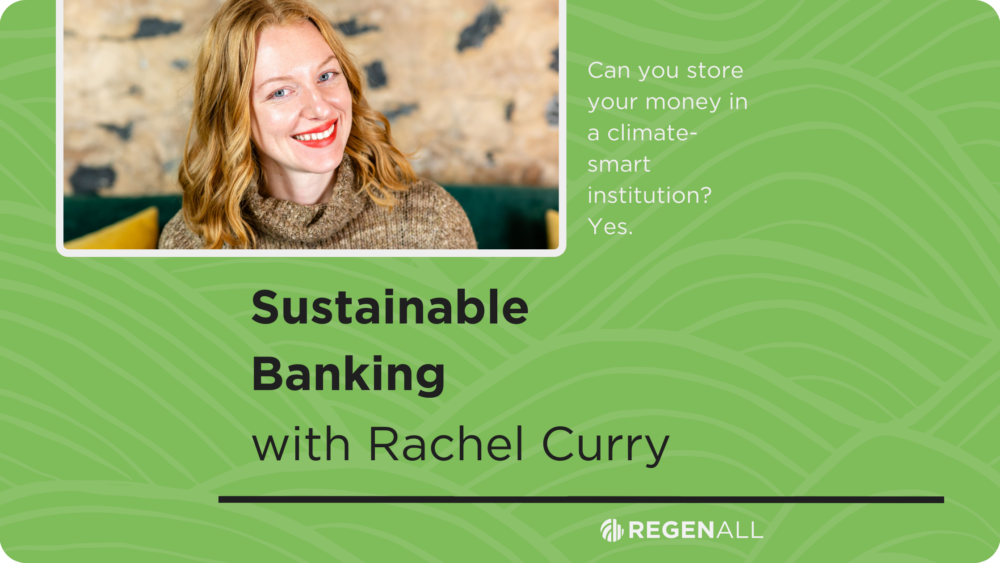If you read my introduction to sustainable investing, you already know how investors can reap financial returns while also making a positive impact on society and the environment.
When it comes to putting your money to work for the environment, investing in renewable energy, carbon offset, and more is just the beginning. What about all that money living in your savings and checking accounts?
Not all bank accounts treat the environment well—but in true solutions-focused fashion, there are many that do. Here’s why sustainable banking matters and how you can move forward by storing your money in an environmentally sound institution of your choosing.
Your money is never idle
If you put your money into a bank account and it’s sitting in plain old cash, banks still use that money. This is called leveraging. In fact, banks are only required to keep 2.5% of held assets as liquidity buffers, according to the FDIC.
By over-leveraging, banks risk being unable to honor customer withdrawal requests, a scenario we saw play out in March 2023 with the collapse of Silicon Valley Bank. Startup business banking customers began to withdraw funds at higher rates than normal, causing panic. Within two days, so many customers had withdrawn funds that SVB was unable to keep up, and the institution folded.
So what are banks doing with that money that is, at least on paper, yours to control?
Most of the time, they use your deposits to lend funds out to other companies at a cost. Most of the time, you as a customer have no control over who or what your bank decides to lend to. If you’re environmentally conscious, you may be unhappy to find out a lot of that money is going to the growth and development of fossil fuel companies.
The fossil fuel flaw in banking
Eleven of the largest U.S.-based banks each lend an average of 19.4% of their portfolios to carbon-intensive industries, according to Project Drawdown. Strictly speaking, these loans are what keep oil, gas, and coal companies afloat and prevent faster development in renewable energy.
Some of the biggest offenders to the fossil fuel flaw in North American banking include:
- The Royal Bank of Canada
- JPMorgan Chase
- Citigroup
- Wells Fargo
- Bank of America
It’s important to be aware that banks that have joined the Net-Zero Banking Alliance may not be doing enough, particularly if they’re still directly contributing to fossil fuel company growth at the same time.
Fortunately, the solution to the fossil fuel flaw in banking is becoming increasingly clear. By choosing to bank with institutions who have dramatically reduced or totally eliminated carbon-intensive lending, companies and individuals can ensure their dollars are not covered in oil.
Bet on banking for the environment
There are an increasing number of environmentally conscious banks who state that they do not lend to carbon-intensive corporations. Some of these include:
- Amalgamated Bank, which pledges 32% of its loan portfolio to climate solutions
- Clean Energy Credit Union, which financed more than 10,000 clean energy loans by 2023
- Beneficial State Bank, which awarded 4,417 grants to its Clean Vehicle Assistance Program totaling $22 million
- Climate First Bank, which supports causes like affordable housing and commercial solar.
- Atmos Financial, which offers bank accounts that exclusively fund solar and electrification
This is just the start, and it’s by no means an exhaustive list. What’s important to note is that you can take step one now by sparking a conversation to learn more about your different options. Make sure you browse through the different products, review FDIC insurance, and speak to a representative to optimize your money and impact.
Where to go from here
When investing for the environment, it’s best to find solutions you know you can trust and ones that are easy to maintain. Banking is a form of investing, and optimizing it for climate justice is a straightforward process. The reality is that your money is never idle in a bank like it would be in a shoe box under your bed. If your money is going to be busy anyway, why not make sure it’s doing good for the planet?

Rachel Curry is a journalist based in Lancaster, Pennsylvania, contributing to publications like CNBC and LNP. Her work focuses on finance and technology on a global scale, as well as local issues impacting her community. See more of her work at www.writingsofrachel.com, and contact her at hi@writingsofrachel.com or linkedin.com/in/rachelcurry95.



Comments are closed.